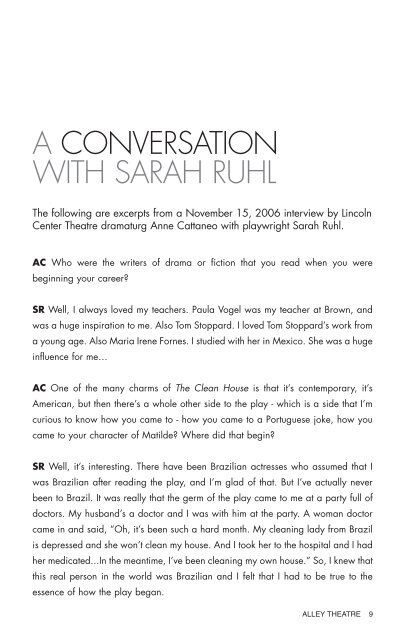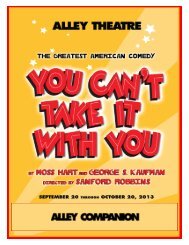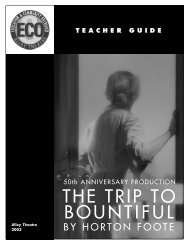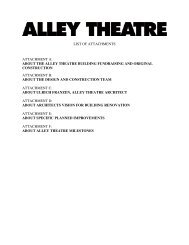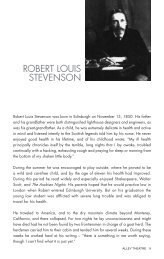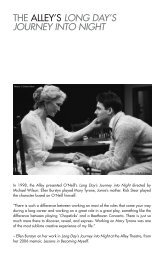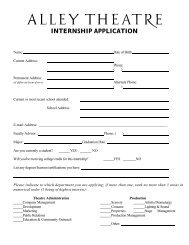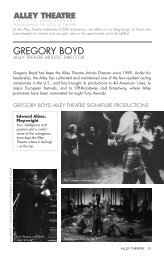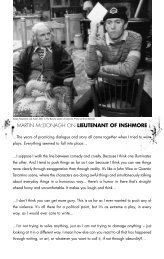A CONVERSATION WITH SARAH RUHL - Alley Theatre
A CONVERSATION WITH SARAH RUHL - Alley Theatre
A CONVERSATION WITH SARAH RUHL - Alley Theatre
You also want an ePaper? Increase the reach of your titles
YUMPU automatically turns print PDFs into web optimized ePapers that Google loves.
A <strong>CONVERSATION</strong><br />
<strong>WITH</strong> <strong>SARAH</strong> <strong>RUHL</strong><br />
The following are excerpts from a November 15, 2006 interview by Lincoln<br />
Center <strong>Theatre</strong> dramaturg Anne Cattaneo with playwright Sarah Ruhl.<br />
AC Who were the writers of drama or fiction that you read when you were<br />
beginning your career?<br />
SR Well, I always loved my teachers. Paula Vogel was my teacher at Brown, and<br />
was a huge inspiration to me. Also Tom Stoppard. I loved Tom Stoppard’s work from<br />
a young age. Also Maria Irene Fornes. I studied with her in Mexico. She was a huge<br />
influence for me…<br />
AC One of the many charms of The Clean House is that it’s contemporary, it’s<br />
American, but then there’s a whole other side to the play - which is a side that I’m<br />
curious to know how you came to - how you came to a Portuguese joke, how you<br />
came to your character of Matilde? Where did that begin?<br />
SR Well, it’s interesting. There have been Brazilian actresses who assumed that I<br />
was Brazilian after reading the play, and I’m glad of that. But I’ve actually never<br />
been to Brazil. It was really that the germ of the play came to me at a party full of<br />
doctors. My husband’s a doctor and I was with him at the party. A woman doctor<br />
came in and said, “Oh, it’s been such a hard month. My cleaning lady from Brazil<br />
is depressed and she won’t clean my house. And I took her to the hospital and I had<br />
her medicated...In the meantime, I’ve been cleaning my own house.” So, I knew that<br />
this real person in the world was Brazilian and I felt that I had to be true to the<br />
essence of how the play began.<br />
ALLEY THEATRE 9
Question Can you give words of advice to<br />
beginning playwrights? What do you know now that<br />
you wished you had known when you started?<br />
SR Well, it’s very fun, I think. I’m glad that no one sat down and gave me the hard<br />
knocks speech, even though it’s true. It takes a while to make a life in theater; it takes<br />
a very long time. It requires a lot of patience. Next, I would say, find your people.<br />
Find the people whose work you love as actors and directors, people your own age<br />
who are doing things you love, and form a little band. Get your work done sooner<br />
rather than later, so that your patience doesn’t run out. You need patience over the<br />
long haul, but in the meantime you want to see your work.<br />
I think that playwrights are very weird hybrids— people who like to be alone very<br />
much, but then actually they’re dying to go to a party and see people. I love my<br />
solitude when I’m just alone at my desk, but then I love it when the first day of rehearsal<br />
comes and all the actors are in the room together. That’s the most exciting time.<br />
Q Have you ever had a play rejected and then accepted?<br />
SR They’ve all been rejected. I mean, every single one of them has been rejected<br />
by someone. I have a little file of them, a little file of rejection letters. And I have a<br />
friend, a short story writer, who actually papers his apartment with them. And I don’t<br />
do that. I just keep a little file.<br />
Reprinted with permission from Lincoln Center Theater<br />
10 PLAYBILL


